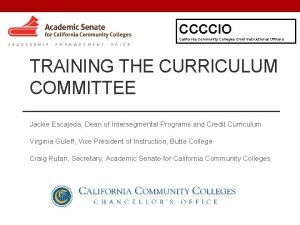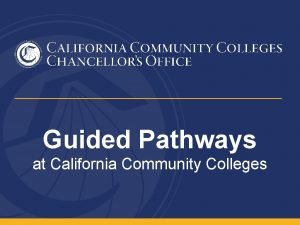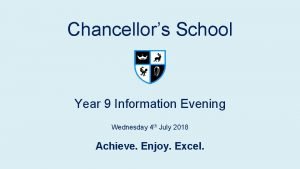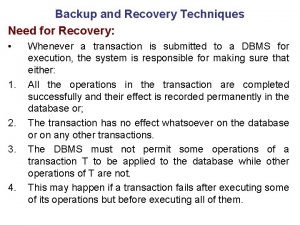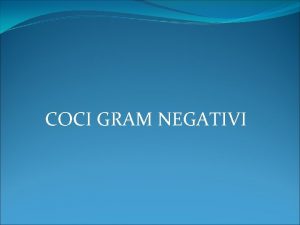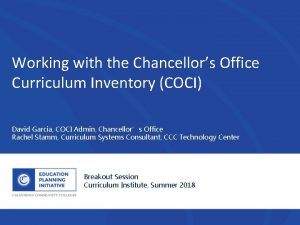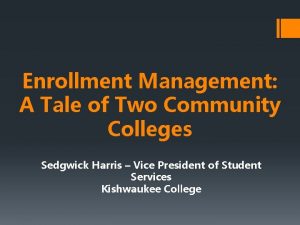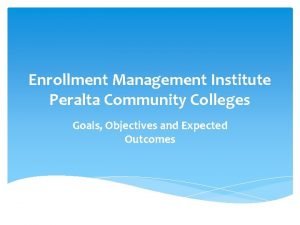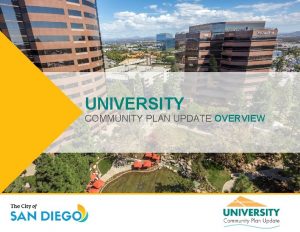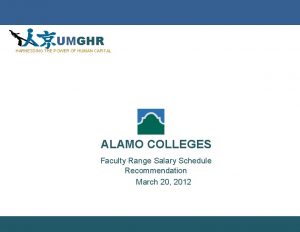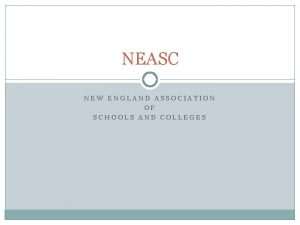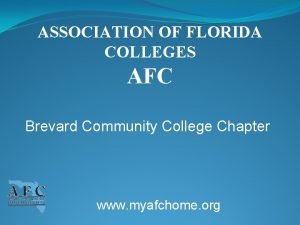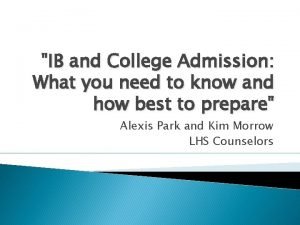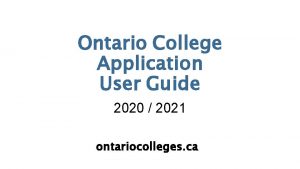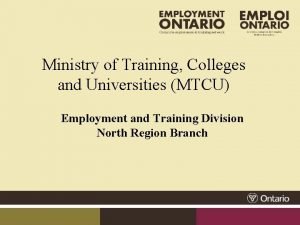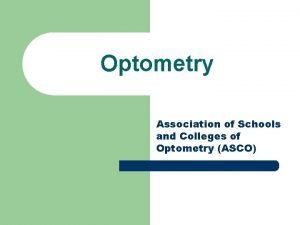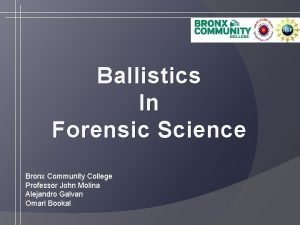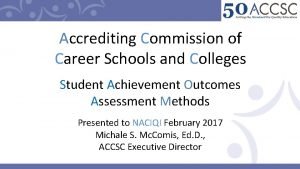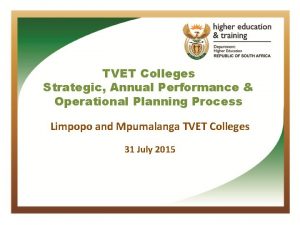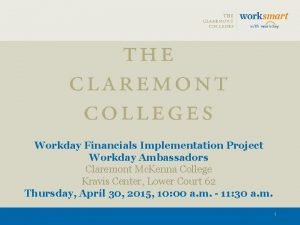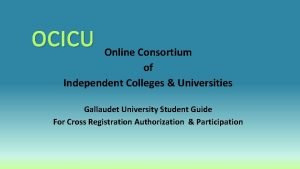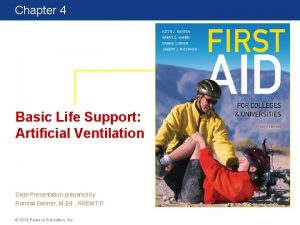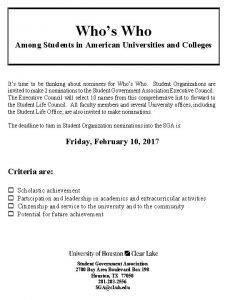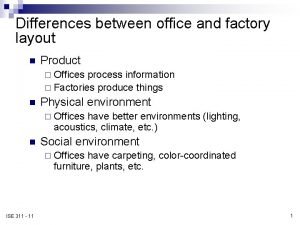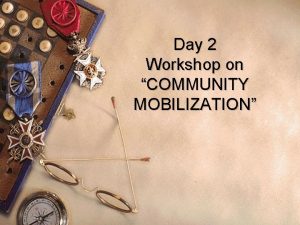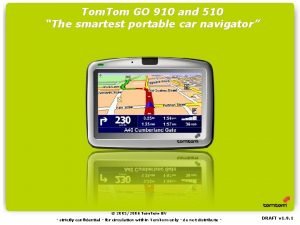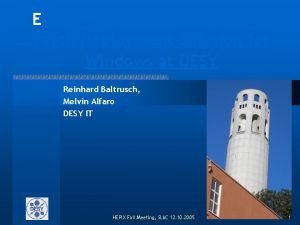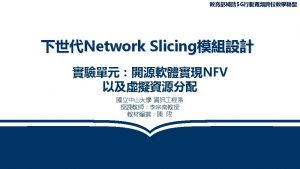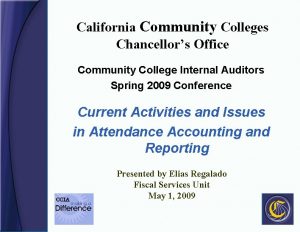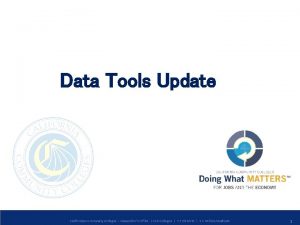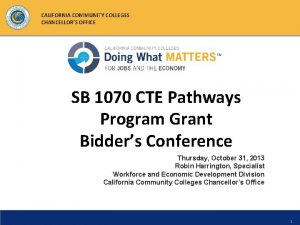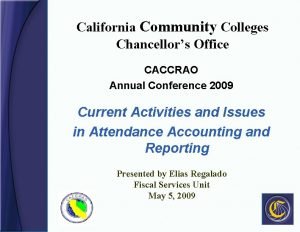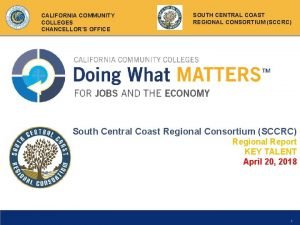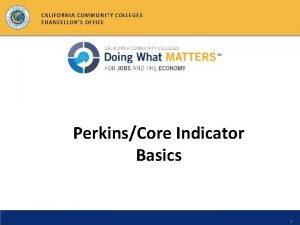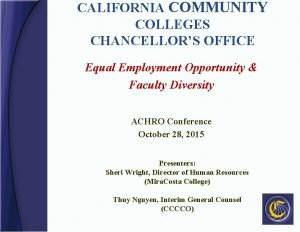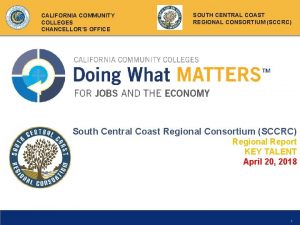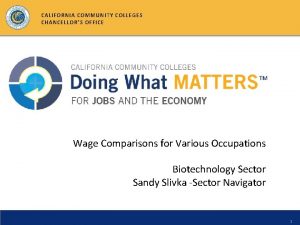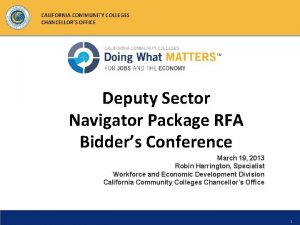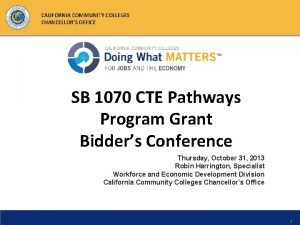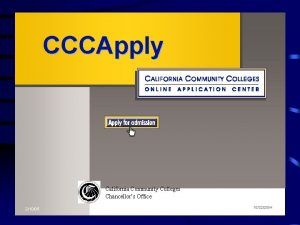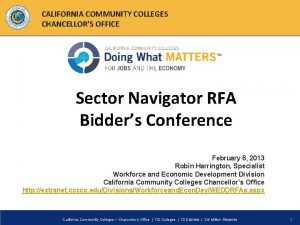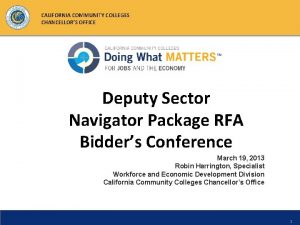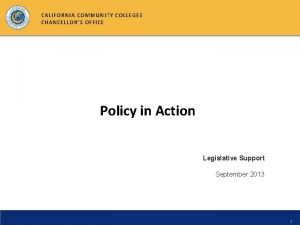CALIFORNIA COMMUNITY COLLEGES Chancellors Office Update 1 COCI





















































- Slides: 53

CALIFORNIA COMMUNITY COLLEGES Chancellor’s Office Update 1

COCI Submission Requirements Raul Arambula David Garcia Kevin Lovelace, Ed. D. Kevin Olson 2

Overview • Curriculum Process • Credit Courses • Certificates of Achievement (COA) • IGETC/CSU GE Breadth COAs • Associate Degrees (non-ADTs) 3

Curriculum Process Local Curriculum Process College Software College Catalog ACCJC and External Accreditation Chancellor’s Office Curriculum Inventory College Participation Agreement 4

Curriculum Streamlining – Chancellor’s Office (CO) Responsibilities • Credit courses are locallyapproved: • July 2017 • Cooperative Work Experience courses are locallyapproved: • April 2018 • CO - reviews curriculum that is not part of the streamlining. • CTE Certificates of Achievement (New) • CTE AS/AA Degree (New) • ADTs (New/Sub/Modified) • CDCP Noncredit (short term vocational) (New) 5

Curriculum Streamlining – Chancellor’s Office (CO) Responsibilities • CO conducts Periodic Review • CO provides technical assistance and training • CO Curriculum staff are assigned to specific colleges: • colleges can be served holistically • one point of contact. 6

Standard Formula for Credit Hour Calculations 7

Outside-of-Class Hours 8

Example 9

Sample Calculation Tables Semester Calculations 10

Credit Courses 11

Credit Course Review • Review CB fields o Credit Status – CB 04 o Course Title – CB 02 o TOP Code – CB 03 o Sam Code – CB 09 o Unit fields – CB 06 & CB 07 • Ensure the completeness of the COR • Verify hours and units 12

Modified & Substantial Changes to Credit Courses • Modified. Change • An action to change an active course record that will not initiate a new control number. • (Example: Course Title or Transfer Status) • Substantial Change • An action to create a new course record based upon an active course record. This action will initiate a new control number. • (Example: TOP Code, Number of Units or SAM Priority Code) 13

Credit Course Submission • • • Complete proposal record Units to Hours calculations Attached Course Outline of Records (CORs) CB 03 (TOP Code) - CB 09 (Sam Priority Code) Relationship Repeatable/Repeatability Cooperative Work Experience 14

Cooperative Work experience

Cooperative Work Experience (CWE) • • Title 5 was revised for CWE to transfer local authority to the districts/colleges CWE plans are now required to be approved by the district governing boards Recommend submitting a new plan to the district governing board Units are awarded based on student on-the-job-training hours • • (75 paid hours or 60 unpaid hours = 1 semester unit) Units are awarded for on-the-job training hours and not for lecture. 16

Relationship: CB 03 – CB 09 CB 03: Top Code • Vocational TOP Code denoted in the inventory • With an asterisk (*) • Non-vocational (CTE) CB 09: SAM Priority Code • A: Apprenticeship • B: Advanced Occupational • C: Clearly Occupational • D: Possibly Occupational • E: Non-Occupational 17

Repeatable Courses • Courses for which repetition is necessary to meet the major requirements of CSU or UC for completion of a bachelor’s degree • Intercollegiate Athletics • Intercollegiate academic or vocational competition • Cooperative Work Experience 18

Programs 19

Chancellor’s Office Review: Certificate of Achievement ü ü ü Proposal fields filled in correctly Course Outline of Records (CORs) attached CORs match throughout submitted documentation Course units in Narrative match those in COR Narrative is complete and accurate Total units on proposal match total units on Narrative 20

Chancellor’s Office Review for CTE • Supporting Documentation • Labor market Information (LMI) & Analysis • Regional Consortia Recommendation • Advisory Committee Recommendation • Program Review Date: • Must be every 2 years, • Education Code 78016 21

Noteworthy • Program Award • Program Goal • Units matching the Narrative • Supporting Documentation • Listing all CORs 22

Chancellor’s Office Review: Associate Degrees ü Proposal fields filled in and accurate ü CORs attached ü CORs in Narrative, Course Report & Supporting Documentation match ü Narrative is complete and accurate ü Course units in the Narrative match those in the COR ü Major and Total units on proposal match Narrative 23

Common Errors • Proposal: • Units don’t match Narrative • Missing Supporting Documentation • CORs not listed • ASSIST/Articulation Agreement for Transfer degrees 24

Common Errors • Program Requirement section: • Units don’t match the program proposal record • Courses listed don’t match the courses listed in the program proposal record • Must use the appropriate General Education pattern for the degree (e. g. , CSU GE or IGETC for Transfer degrees, local college GE pattern for CTE or local degrees) 25

Program Goals for non-ADT Degrees • Transfer (T): All ADTs and Certificates of Achievement for CSU GEBreadth or IGETC • Local (O): All other AA and AS degrees and certificates not in a CTE TOP Code, that are developed to meet locally defined needs. • Career Technical Education (C): Limited to a program in a CTE TOP Code. 26

LMI for CTE COAs & Degrees • • Required for CTE programs Within two years & region college serves Employer survey okay in lieu of LMI Data on Wages should be included • Regional Net Annual Labor Demand matches Proposal 27

Associate Degrees for Transfer Common Submission Errors • Missing Course Outline of Records (CORs) for the associated courses • All COR’s must meet Title 5, Section 55002 (a)(3) regulations • Missing required articulation documents: • Articulation Agreement by Major (AAM) from ASSIST • CSU Baccalaureate Level Course List by Department (BCT) from ASSIST • CSU GE Certification Course List by Area (GECC) from ASSIST 28

Associate Degrees for Transfer Common Submission Errors • CCCCO access C-ID to confirm if a course is C-ID approved to the descriptor on the TMC. • No need to attach documentation if courses are C-ID approved. • If a course is not yet C-ID approved but has been submitted to C-ID over 45 days, must provide verifiable documentation of the course submittal to C-ID. 29

Associate Degrees for Transfer Common Submission Errors • Course information on the TMC does not match corresponding CORs • TMC attached is not the most recent updated template. • ICW Policies (SB 1440/SB 440): TMC Review and Revision Criteria and Processes During 5 -year Review 30

ICW Policies (SB 1440/SB 440): TMC Review and Revision Criteria and Processes During 5 -year Review 4. If a TMC is revised, a determination must be made as to whether the revision will: a. Require existing degrees to be revised b. Impact determinations of similar i. If the revision will require a and or b, the FDRG must provide a rationale for the change and the resulting impact. The impact on determinations of similar will be determined prior to the review of the rationale. The rationale will be reviewed and accepted or denied by the faculty subgroup of the ICW. 31

ICW Policies (SB 1440/SB 440): TMC Review and Revision Criteria and Processes During 5 -year Review 1. If the rationale is accepted and existing degrees will need revision, CCCs will have one year from the determination to make the required degree modification. 32

ICW Policies (SB 1440/SB 440): TMC Review and Revision Criteria and Processes During 5 -year Review c. If a TMC is revised, it will need to be resubmitted to the CSU for determinations of “similar” and will necessitate recertification of all currently approved transfer degrees. 33

Associate Degrees for Transfer Common Submission Errors • Information on the Narrative does not correspond with the TMC. • Units for major does not match the TMC • Courses are different • Double-count does not match the TMC 34

Associate Degrees for Transfer Common Submission Errors • Double-count on the TMC • Maximum double-count from any single course is 3 units, regardless of the local college unit value of that course. 35

Associate Degrees for Transfer Common Submission Errors • Double-count on the TMC • Area B (CSU GE) has a maximum of 9 units that may be doublecounted. Therefore, B 3 (1 unit) may only be counted when the total from this area is less than 9 units. 36

Associate Degrees for Transfer Common Submission Errors • Double-count on the TMC • In Area C (CSU GE)/Area 3 (IGETC) and Area D (CSU GE)/Area 4 (IGETC), only two courses from one subject area may be counted towards double-count. • The maximum units counted towards double-count in these areas are 9 units. 37

Distance Education 38

Instructor Contact • (a) Any portion of a course conducted through distance education includes regular effective contact between instructor and students, and among students, either synchronously or asynchronously, through group or individual meetings, orientation and review sessions, supplemental seminar or study sessions, field trips, library workshops, telephone contact, voice mail, e-mail, or other activities. Regular effective contact is an academic and professional matter pursuant to sections 53200 et seq. • (b) Any portion of a course provided through distance education is conducted consistent with guidelines issued by the Chancellor pursuant to section 409 of the Procedures and Standing Orders of the Board of Governors 39

Noncredit Philosophy and Founding Legislation 40

Noncredit Legal Authority • Education Code § 70901 • The Board of Governors, by statute, has statewide responsibility for approving all new instructional noncredit programs in community colleges. • Title 5, § 58050 - Conditions for Claiming Attendance

Noncredit Curriculum Categories ● ● Noncredit courses are classified into 10 legislated instructional categories (nine defined in Ed. Code § 84757 and the tenth defined in Ed. Code § 84760. 5 for CDCP). The placement of a course into an instructional category is driven by the objectives of the course, and in limited circumstances as permitted by statute, the target population served.

Noncredit Curriculum Categories

Noncredit Course Outline of Record (COR) • All courses are required to have an official COR • Current CORs must be maintained in the official college files (paper or electronic database) and made available to each instructor. • For noncredit distance education, COR must specify expected hours of outside-of -class student work (§ 58003. 1(f)(2)) • “[o]utside-of-class work expected as noted in the course outline of record…” (Title 5, 58003. 1(f)(2))

Noncredit Course Outline of Record (COR) • Noncredit COR must meet the standards in title 5, § 55002 (c) and contain components described in subsection (2): “[(2)] Course Outline of Record. The course is described in a course outline of record that shall be maintained in the official college files and made available to each instructor. The course outline of record shall specify the number of contact hours normally required for a student to complete the course, the catalog description, the objectives, contents in terms of a specific body of knowledge, instructional methodology, examples of assignments and/or activities, and methods of evaluation. ”

Leveraging Noncredit to Promote and Sustain Equity 46

Equity in the Vision Keeping Equity at the Core of Noncredit Planning! q q q Funding and leveraging resources (CAEP, Guided Pathways, AB 705, Strong Workforce, WIOA, etc. ) Administration (local vision, mission, goals, short-term and long-term planning) Professional Development (CCC Virtual Resource Center for tools, learning communities, system-wide events, professional associations) 47

Hot Topics! 48

Hot Topic!: Noncredit Streamlining for Local Approval • March 2019: 5 C recommended amendments to Title 5 • July 2019: Board of Governors (BOG) approved • Sept 2019: Memo AA 19 -34 • TO: CEOs, CIOs, Senate Presidents, Curriculum Chairs, ASCCC, Curriculum Specialists 49

Hot Topic!: Noncredit Streamlining for Local Approval • Next Steps: Amended regulations must be officially codified and “chaptered” into Title 5 (pending review by Dept. of Finance, Secretary of State, etc. , ) • The timeframe for these actions to occur are not determined by Chancellor’s Office • CO General Counsel (Legal Office) will announce and post to CO web page once regulations are adopted and filed with Secretary of State 50

Hot Topic!: Noncredit Streamlining for Local Approval • Educational Services will announce to constituents (CIOs, CSSOs, ASCCC, Curriculum Specialists, etc. ) • Noncredit Curriculum Authorized for Local Approval: • Noncredit Courses (all categories EC 84757) • Noncredit Certificates and Programs* • Career Development and College Preparation (CDCP) *Does not include Short-term Vocational certificates • Adult High School Diploma Program (AHSD) 51

Hot Topic!: Advanced and Specialized Public Safety Courses • April 12, 2019… • CO Memorandum AA 19 -18: Noncredit Advanced and Specialized Public Safety Curriculum Proposals • Sent to: CEOs, CIOs, Senate Presidents, Curriculum Chairs, ASCCC, Curriculum Specialists • Education Code § 84757; noncredit legislative Intent; equity framework 52

Hot Topic!: Advanced and Specialized Public Safety Courses • Increase in noncredit advanced public safety course proposal submissions • Why the increasing trend? Funding implications? • Options? Credit course, if required for Legally Mandated Training; Title 5, sec. 55040 (b)(8)(9): District Policy for Course Repetition 53
 Chief instructional officers california community colleges
Chief instructional officers california community colleges Chief instructional officers california community colleges
Chief instructional officers california community colleges Cccco guided pathways
Cccco guided pathways Chancellors school
Chancellors school Recovery techniques based on immediate update
Recovery techniques based on immediate update Coci gram pozitivi
Coci gram pozitivi Coci
Coci Community colleges
Community colleges Association of canadian community colleges
Association of canadian community colleges Community education and training colleges in south africa
Community education and training colleges in south africa Washington state board of technical and community colleges
Washington state board of technical and community colleges Community colleges
Community colleges University community plan update
University community plan update Ccap california community college
Ccap california community college Alamo colleges salary schedule
Alamo colleges salary schedule New england association of colleges and schools
New england association of colleges and schools Chon buri colleges and universities
Chon buri colleges and universities Brevet des colleges
Brevet des colleges Association of florida colleges
Association of florida colleges Different types of colleges
Different types of colleges Ib friendly colleges
Ib friendly colleges Ontario colleges app
Ontario colleges app Mtcu timmins
Mtcu timmins Yaroslavl state technical university
Yaroslavl state technical university Association of schools and colleges of optometry
Association of schools and colleges of optometry Colleges for forensic ballistics
Colleges for forensic ballistics Accrediting commission of career schools and colleges
Accrediting commission of career schools and colleges Northern ireland colleges
Northern ireland colleges Restoration movement colleges
Restoration movement colleges Alamo colleges 1098 t
Alamo colleges 1098 t Tvet colleges limpopo
Tvet colleges limpopo Claremont workday
Claremont workday Ocicu courses
Ocicu courses Fh
Fh Cmc sakai
Cmc sakai Chelyabinsk colleges and universities
Chelyabinsk colleges and universities First aid for colleges and universities
First aid for colleges and universities Forprofit colleges
Forprofit colleges Who's who in american colleges and universities
Who's who in american colleges and universities Writing colleges
Writing colleges Ufa state petroleum technological university
Ufa state petroleum technological university World federation of colleges and polytechnics
World federation of colleges and polytechnics Difference between office location and office layout
Difference between office location and office layout Prepare to scale up in community mobilization
Prepare to scale up in community mobilization Raksha tpa claim
Raksha tpa claim Tom tom go 910
Tom tom go 910 Download oracle jre 7 update 51 (64-bit) for polybase
Download oracle jre 7 update 51 (64-bit) for polybase Microsoft update
Microsoft update Bankhead primary school
Bankhead primary school Yum update reboot
Yum update reboot Cucm native call queuing
Cucm native call queuing Injector update
Injector update Chrome update
Chrome update Publishing swansea
Publishing swansea
